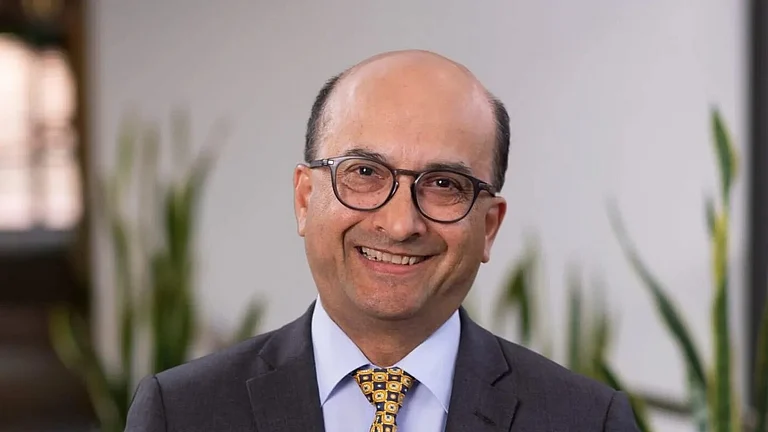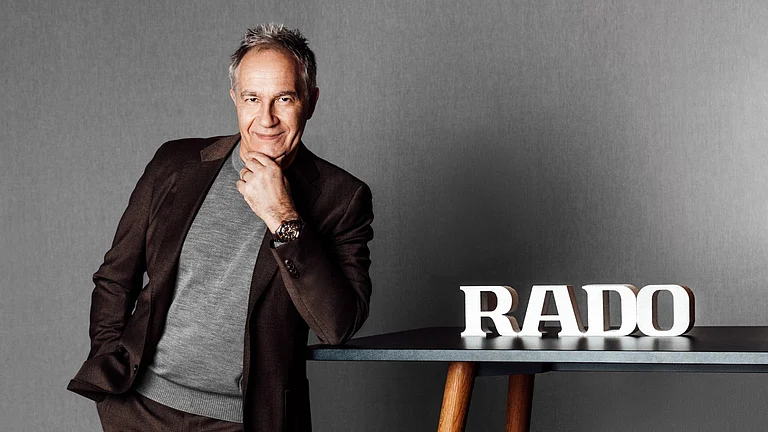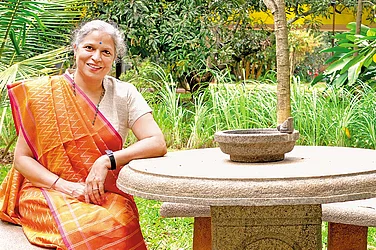“Kabhi kabhi jeetne ke liye kuch harna padta hai… aur haar kar jeetne wale ko baazigar kehte hai (sometimes, to win, you must lose something… and the one who loses to finally win is called a maverick). This famous dialogue of Shah Rukh Khan from his movie Baazigar aptly describes the story of Vedantu and its founders.
Founded in 2012, Vedantu faced a major setback in 2017 and was on the brink of being closed down when one of its investors backed out at the last minute. Vamsi Krishna, Pulkit Jain and Anand Prakash—the founders—had to let go of a third of their staff and had a tough time retaining the rest. Four years down the line, the edtech platform has attained a unicorn status and hopes to reach about 1 million paid users by the end of FY22. So, how did the turnaround happen?
It was 2005 and the trio’s third Goa trip—much inspired by Dil Chahta Hai, Farhan Akhtar’s directorial debut. “We were young dreamy guys just out of college. Not knowing much about what we really wanted to do, we got into our respective jobs—Vamsi in Chennai, me in Gurgaon and Anand in Barnala. But we knew during the trip that kuch toh karna padega (we had to do something),” says Pulkit, currently head of product at Vedantu, in a chat with Outlook Business.
Soon after, the friends went to Anand’s village in Punjab, where they interacted with the kids of workers employed at Anand’s workplace. It was December 12, 2005. After the interaction, the trio didn’t speak a word to each other. “We had never felt so overwhelmed in our lives before,” Pulkit adds.
The next morning, Anand decided to quit his job and teach kids instead. It wasn’t an easy decision. “My mother scolded me like anything… she told me nobody would marry me now,” Anand recalls with a laugh.
Vamsi and Pulkit joined in, and together, they founded Lakshya, a coaching institute based in Patiala. Their seven-year-long stint at Lakshya was, in many ways, a precursor to the eventual setting up of Vedantu. During the stint, the founders were bootstrapped and funded the venture from their own cashflow. Interestingly, the only external investor who helped was Rajinder Gupta, the chairman of the Trident Group and Anand’s boss. The response to Lakshya was good. By 2011, the venture had expanded to four locations and grown to a 250-people team, teaching over 3,600 students.

Early Lessons
The founders soon realised that it was tough to scale up a physical coaching institute venture.
“We understood that people don’t become teachers, and those who do, are hesitant to go to Tier-III and Tier-IV cities,” recalls Pulkit. The reluctance of teachers to go to smaller towns made the founders realise that the key to creating scale would be technology. That was one of the geneses of Vedantu, and the end of the road for Lakshya. In 2012, the founders decided to exit the latter by selling it to Mumbai’s MT Educare.

That technology would be key to the implementation of their vision was only one of the lessons that the trio learnt. For Vamsi, the experience cemented the belief that things happen if you believe in them. A self-confessed fan of AirBnb and the journey of its founders, he found inspiration in their story. “They started off by going into New York apartments and taking pictures. They never thought about how it would scale. We related to that.”
The fact that Lakshya was founded at a time when the start-up ecosystem in the country was very nascent helped the team prioritise their passion, which they carried over to their journey at Vedantu.
“The craze of building a large company, unicorns... we never believed in that. That was not our goal, just an outcome,” Vamsi adds.
Roadblocks Ahead
Finally, Vedantu was born in 2012. While they were fascinated by the concept of live online teaching and learning, they needed to know whether suitable technology was available in a pre-4G world. Several other questions were on their minds, too: Will the pricing work? Which grades and demographics will the platform cater to?
While the start-up culture had improved by then, it was still difficult to explain to customers and investors how the model would work. Parents, who had themselves studied in the offline mode, were especially hard to convince. In other words, it was a fairly slow start. In July 2013, they managed to raise a pre-seed funding of about Rs 150,000. That was followed by a seed fund of Rs 400,000 a year later in August. The big moment came in 2015 when global investment firms Accel and Tiger Global Management poured in Rs 5 million in Series A round of funding.
Then came the blow. In 2017, when Vedantu was in the process of raising more funds, an investor backed out at the last minute, pushing the start-up to the verge of closure.

“It was tough for us because for those two to three years, we were the only ones doing live teaching and the world hadn’t risen to the concept till then,” Pulkit says. “We began questioning ourselves and the efforts we had put in over the years.”
Nobody anticipated the investor backing out. “In hindsight, it was probably not even ethical for them to do so. But it is history now,” adds Vamsi.
The founders even had to let go of 30% of their team members. But it was tougher to motivate those who were left behind. Saurabh Saxena, one of the co-founders, also exited around the same time.
“It was essentially a sacrifice which some had to make so that the company survives,” Vamsi says.

The founders spoke to the people who were leaving and promised reinstatement once things got better. Many left behind requested a reduction in their salaries so that more people could be retained. Such display of character by the team gave the founders renewed confidence to stay put.
“One of the questions that we asked ourselves was: ‘What do we do if things don’t work out?’” says Pulkit.
The answer was simple. “We would do the same thing again because our hearts lie here,” he adds. They reminded themselves that if needed, they would keep Vedantu afloat out of their own pockets, just like they had done with Lakshya.
The founders’ conviction helped others such as Accel, a US-based venture capital fund that had been on board with Vedantu from the very start, to keep confidence in the edtech start-up.
“Accel truly believed in our vision and backed us at a time when everyone else was leaving,” says Vamsi.
For Accel, it was a gesture of support meant for a set of founders it believed in, and a model which it thought still held a market opportunity.
“Partnering means not just partnering through good times but also bad times,” says Manasi Shah of Accel. “We’ve seen companies go through such times and come out of it. Those journeys gave us comfort that we can tide over the bad times as long as the fundamentals are strong. It felt like this is something which can turn around,” she adds.
After Accel reposed its faith in Vedantu, a number of other players came on board. Around March 2018, the founders were able to convince US-based investment firm Omidyar Network to invest. In August 2019, Trifecta Capital Advisors injected Rs 94.2 million. There was no looking back after that.
Renewed Approach
A number of people whom they had to let go in 2017 were also called back as the situation improved. Many of them rejoined and now hold senior positions in the company. Hari Sharan Luthra, currently Head of Teacher Excellence at Vedantu, was one of them. He had resigned just a few months before the crisis hit Vedantu, citing personal reasons. He recalls being surprised by the founders’ lack of action in trying to stop him.
“I could understand that things were not good at Vedantu,” he says.
Luthra’s association with the founders goes back to 2009, during their Lakshya days. But he got to know the entire story of what had happened during the “dark days of 2017” only when he visited Bengaluru and met Vamsi. The revelation made him feel guilty.
“My first thought was that I left at the wrong time...Had I been here, I would have been a good support system for the founders,” Luthra says.
The low point of 2017, however, ushered in several small and big changes at Vedantu, eventually paving the way for Luthra’s return. The most significant of them all was the shift from a one-to-one model with one teacher teaching one child to a one-to-many model. The earlier model, the founders realised, was catering mostly to wealthy families belonging to the Indian diaspora across the world. The team, which had set out with the vision of impacting students in Tier-II and Tier-III cities in India, knew things had to change.
“We took the next 2-3 years to understand how we can tweak things to lower the price while keeping the predictability of the outcome intact and reach out to every part of the country,” says Pulkit.
The shift to the one-to-many model proved to be a game changer for their business. In 2017, about 50 students formed a large class. Today, it stands at about 350 students. In order to bring the same level of quality and interaction in larger classrooms, they designed a model under which the entire classroom is divided into small sections and students interact within these small sections. The shift allowed the platform to slash its price to about one-tenth of what it was under the one-to-one model.
However, the margins are higher and the founders proudly say they are able to pay their teachers higher than what some software engineers in Bengaluru make. But, for them, the most satisfying part is that about 78% students on the platform come from Tier-II and other smaller cities. Along with these major victories, they gained popularity in the start-up space, too. They raised their Series D funding, landed Aamir Khan as their brand ambassador, and also sponsored the popular game show KBC (Kaun Banega Crorepati).
After the model was finalised, Vamsi reached out to Luthra, asking him to teach physics on a part-time basis and later persuaded him to join the organisation in a senior management role in September 2019. On Luthra’s part, the doubt about coming back never existed. When asked about what he feels the founders were able to learn and do differently post 2017, he says, “Fundamentally, the difference is in the approach in solving problems. Earlier, if there was something we thought would work out, we went all in. Now, it’s more of an experiment on a smaller scale. If it works, scale it, if it doesn’t, tweak it. We are careful to not fall into wishlist traps or have a tendency to burn cash.”
On a broader level, increasing awareness about online learning in India helped Vedantu as well. While positive changes were seen since 2018, it was the pandemic which proved to be a real turning point. The scale sprung up massively. In 2019, there were about seven lakh students who used to take up free classes on the platform. Last year, that number was ten times that. The team had to scramble to get teachers in a few weeks’ time to cater to the sea of students. In response to huge demand, they also opened a new category of teaching for kids of grades 1-5.
These developments have meant that Vedantu, which was valued at $600 million in its last fundraising in July 2020, is the latest edtech unicorn in the country.
Accel definitely believes this is just the beginning. “I hope we can add a few zeros to the unicorn valuation,” Shah says confidently.































